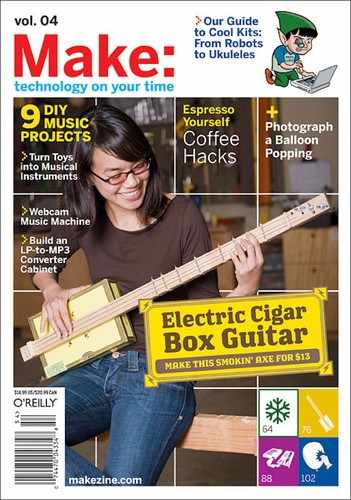OWN YOUR OWN
IF YOU CAN’T
OPEN IT,
YOU DON’T OWN IT
A Maker’s Bill of Rights to accessible, extensible, and repairable hardware.
By Mister Jalopy
![]() Recently, the gas gauge on my 2000 Chevrolet pickup started acting perquacky and, as I’m a lazy person by nature, I asked the Chevrolet dealership what it would cost to repair. At a staggering $800, I briefly considered living without a gas gauge. Picturing certain roadside disaster, I buckled down and decided to fix the problem myself.
Recently, the gas gauge on my 2000 Chevrolet pickup started acting perquacky and, as I’m a lazy person by nature, I asked the Chevrolet dealership what it would cost to repair. At a staggering $800, I briefly considered living without a gas gauge. Picturing certain roadside disaster, I buckled down and decided to fix the problem myself.
Hopeful that I would be able to buy just the fuel sender, Chevrolet broke the news that I would have to buy the combined $500+ Delco fuel pump and sender assembly. Now, only the fuel sender unit was faulty. The fuel pump still worked like a champion but I had to buy the whole pump/sender assembly. Mercifully, my local auto parts store sold the same exact unit for $259.
After draining and dropping the gas tank, I removed the old assembly; it’s clearly designed to have a removable, replaceable fuel sender unit. It’s held in place by two plastic tabs and a single wire connector. And to prove my point, I did remove it. It took longer to get the pliers from the toolbox than it did to disassemble.
Sometimes components fail and you have no idea why, but in this case, the cause of failure was obvious. There are two little spring-metal tangs that glide over the PCB resistor contacts, and one tang had broken off. The metal tangs are fragile, under pressure, and move whenever gas sloshes in the tank, so failure was only a matter of time. After seeing how fine the tangs were, I was surprised that they hadn’t broken earlier. A quick Google search proved I was lucky that it had lasted as long as it had — it’s a very common problem.
“When your covered wagon broke a wood spoke, did you throw away the whole wheel? The whole wagon?”
I bet Chevrolet specified to their subcontractor that the fuel sender unit would be removable. Perhaps they were planning to offer it as a separate SKU. Is it a purely financial decision by Chevrolet to not sell the fuel sender independent of the fuel pump? Or how about just selling the tangs for a dollar? When your covered wagon broke a wood spoke, did you throw away the whole wheel? The whole wagon?
In MAKE Volume 03 (see page 7), Dale Dougherty wrote an essay on what makes a product maker friendly. And it was an idea that stuck in my head as I was building the retromodern remote-control LP-to-MP3 converter cabinet (see page 54) and was extremely frustrated that the Mac mini is a sealed box. Apple techs open it with some sort of putty-knife-like special tool. Sometimes, smart engineering and new solutions require new tools. The Model T required special tools, but they were included with the car. It’s hard to imagine the case for requiring a special tool to open a Mac mini. For all the props that Apple gets for industrial design, would it kill them to put four screws on the bottom? Would that greatly harm the aesthetics?

Photography by Mister Jalopy
“Buying a piece of equipment that you can’t open, repair, or refer to a schematic for means you’re setting yourself up to throw it away tomorrow.”

In the same way digital rights management (DRM) locks up data, buying a piece of equipment that you can’t open, repair, or refer to a schematic for means you’re setting yourself up to throw it away tomorrow.
You don’t own the iTunes songs you buy. Apple does. Granted, I can’t get inside to look at the digital rights software and fully understand what I have agreed to, but I know that it has a limited life. I listen to my grandfather’s 78 RPM records and will always be able to play an unlocked CD, but will my grandkids get to listen to my iTunes library?
If you can’t open it, you don’t own it. You bought the hardware but, like DRM, the manufacturer restricts your use by controlling access, replacement parts, and information. It’s yours and usable only as long as the manufacturer chooses to support and repair it.
So, what does all this have to do with Chevrolet and the fuel sender unit? Clearly, components should be available at a granular enough level to be able to make repairs at reasonable prices. Ideally, you would be able to buy the little metal tangs, but I would be satisfied to buy the sender unit. Chevrolet’s decision to sell assemblies rather than components is unfortunate but understandable. There is a rationale, as they are in business to make money and selling bigger pieces means more money.
After thinking about this, I’ve come up with a Maker’s Bill of Rights. I expect and hope that other makers will add and make changes to this list. Post your suggestions at makezine.com/04/ownyourown.
Mister Jalopy breaks the unbroken, repairs the irreparable, and explores the mechanical world at hooptyrides.com.
